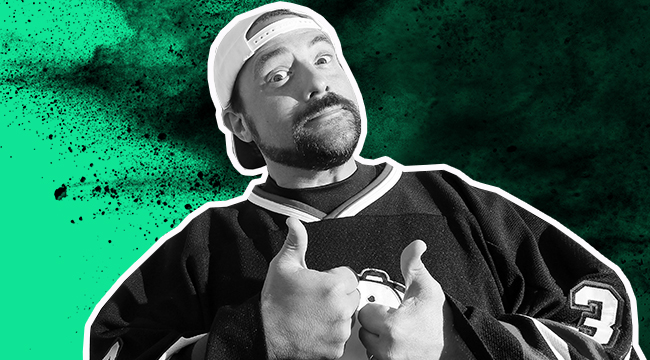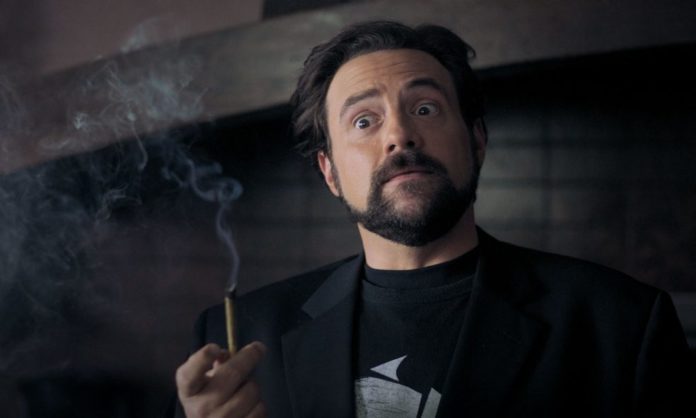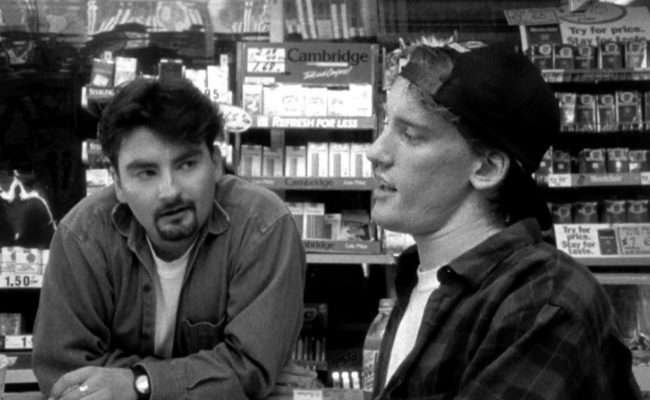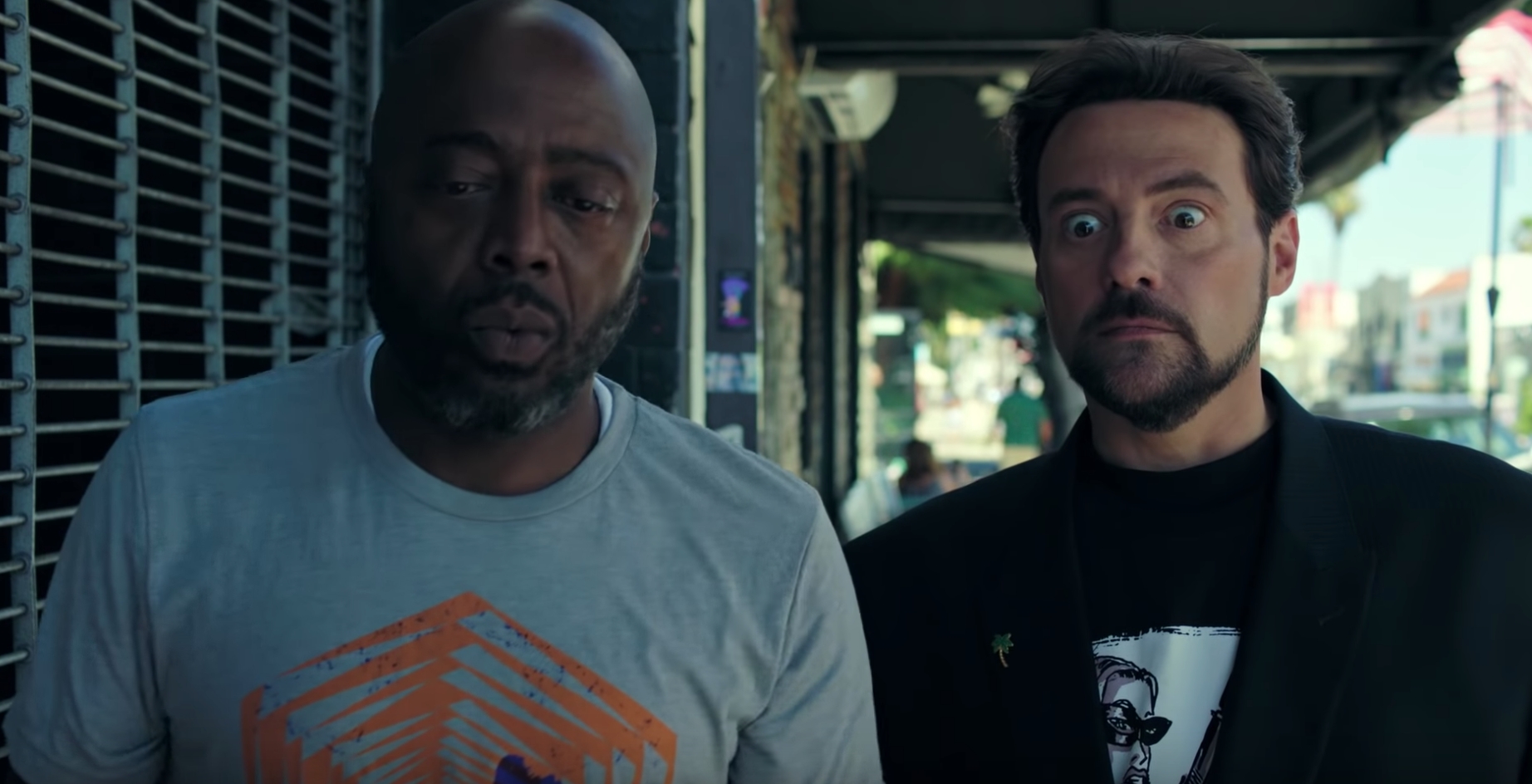
Two and a half years ago, Kevin Smith created a pilot about two friends (Smith and Chappelle Show alum Donnell Rawlings, whose stand up helps influence some the dialogue) and the LA weed dispensary where they work. Nobody bit and the show sat on a shelf until Rivit TV came along with a new platform that would let the audience pre-buy future episodes after watching the pilot (here’s a link to the show’s page on Rivit), flipping the “Go” switch on the production when a certain dollar amount is hit (in this case, $5.3 million, which will greenlight six additional episodes).
It’s the kind of thing that Smith might have said no to in the past, but a near-death experience or health scare can force you to reallocate your focus and change the kinds of things you worry about. And that’s what happened to Smith, who had a massive heart attack in February just after recording a comedy special. Since then, he has shed a bunch of weight, adopted a healthier lifestyle, and an “if not now then when?” attitude when it comes to certain projects and endeavors.
Recently, we spoke with Smith about his past flirtation and subsequent rejection of crowdfunding, his decision to write a starring role for himself in Hollyweed, how this show shares certain DNA with Clerks, and how his heart attack helped lessen his fear of failure.
You gave us all a bit of a scare.
I’ll be honest with you, I’m a creature of the internet. So I know some people like it and some people don’t. I assumed there would be a lot of like, “He’s almost dead! Silent forever! Fuck him.” [But] there were a lot of people who were like, “Aw, that’s a shame. He’s a decent dude.” Or something like that. I got to kind of go to my own wake in advance. Believe me, I like being above ground as well, but it wasn’t bad. I was really dreading looking at the internet the night after the heart attack. I remember in 2005 with Too Fat To Fly, people were like, “Well why would you be on a jet, you fat ass!” So I assumed there’d be a lot of people like, “You live like a fucking pig, of course you almost died.” Instead, there was a lot of empathy, and that was nice. It made it much easier going forward. I was like, “Well, I might as well drop some weight and try to stick around a bit longer.”

With Rivit, how did this come to you? I interviewed you back in October at New York Comic-Con and you had mentioned briefly how Kickstarter wasn’t a thing you were really interested in.
Kevin Smith: Yeah, totally.
This isn’t the same thing, but I’m curious why this appealed to you.
I said to Rivit TV, “Honestly, I’ve always said that I wouldn’t do a Kickstarter or an Indiegogo.” They said, “Well that’s great, because that’s not this.” I was like, “Really? What do you mean?” They explained it, and they were like, “Look, it’s pre-buy. We’re just buying the show in advance.” Because they’re buying the show in advance, we get to make it. When you do Kickstarter or Indiegogo, yeah, everybody gets a copy and stuff like that, but then there’s an event which everyone kind of has to buy tickets for, the actual screening or something like that. They were like, “We’ll know if we have enough money to make the show in 45 days.” Then it instantly goes into the inboxes of all the people that finance it.
To me, I was like, “All right, well it’s not speculative.” It’s not like somebody’s watching a video and going, “Well, this show could be something.” In this case, they can watch the whole episode. The Rivit TV folks came to us about partnering up. They had material that they were interested in seeing if I would make and we were like, “Well, we got a pilot that we made two and a half years ago, that I’m actually in, and I love it, but nobody else likes it. We could never find any home for it.”
When we started talking to the Rivit TV people, Marcus [Wiley, Rivit’s Chief Content Officer] over there, who we had known from a long time ago as we did a project with Fox called The Fox Short-Com. He was our exec on it. He’d come over to Rivit TV, and we told him about Hollyweed. When we watched it, he dug it. He was like, “This is what we’re talking about. This would be a great model to start with.” It’s done, and you can keep going with the concept because the concept is, to be honest, if we’re kind at the very least, it’s just Clerks in a weed store.
For me, what I always loved about it is when I wrote Clerks, I wrote the part Randal to play for myself, that’s why he has all the best jokes. Then a lack of confidence killed that. Of course, when I got to production I was like, “Are you fucking kidding me? You can’t act. You can barely fucking direct. You don’t even know if you can do that, and you’re going to try to act as well? Fuck you. Don’t do that.” And I cast Jeff Anderson, and I took the Silent Bob role because I was like, “Well, if I’m going to pay for it, I at least want to be in it. I’ll be able to look back years from now and be like, ‘Look at that fucking idiot. He wasted all his money with this shit.'” So I kind of stepped back, and I regret it to this day. I love Clerks, and I love what Jeff Anderson did and stuff.
If I had played Randal… It’s probably for the best, honestly, that I didn’t wind up playing Randal, but if I had played Randal, we’d probably be on Clerks 39 right now. I would have done one of those motherfuckers a year. Because, you know, that was my life, and I enjoyed it. I love retail. It allows you to… Workplace comedy was what created my career, so I would have kept going. Maybe it’s good that I didn’t play Randal, because that couldn’t have happened. Jeff had the good sense to be like, “yeah, that’s enough.” Me, I would just keep going.

With Hollyweed, it was kind of this weird coming full circle moment, where I was like, “Okay, now’s your chance to play the other guy. Now you can be one of the two clerks in this modern day version of Clerks that takes place in a weed store, and you’re very well equipped.” Just like back in the day, I would be well-equipped to play Randal because that was my life, I’m very well equipped to do the workplace comedy about working in a weed store.
You know how they always talk about the goal of this field — not so much the business, but this art form — is to tell the stories you want to tell. You self-express. It’s about, I hate the word vision, but it’s about your point of view. It’s like that’s the only thing I have of value to offer anybody. There’s just my point of view. I can’t do other people’s points of view. I can’t take somebody’s wonderful script and turn it into its own separate movie and stuff. I can only bring my point of view to the table. This is a process where you can bring your point of view and there’s literally no “well, you should shave this off” or “this part should go away.” There’s no development process. The promise of “hey, do whatever you want” hasn’t really been fulfilled since the first movie I made.
On Clerks, everybody literally did whatever I wanted. I don’t mean we fucking did coke and we had tons of hookers, but whatever story I wanted to tell, whoever I wanted to cast, I could. It’s never happened again. Even with the films where I had the most creative freedom, sooner or later there’s compromise. In order to get something done, you have to decide to let this go or let go of this thing that you thought you really wanted. This process, as Marcus explains it… that doesn’t exist. He’s like, “We don’t have a development team. It’s all about basically finding your audience and having that audience pre-buy it to the point where we can go forward with episodes.”
Is that frightening?
If you had asked me [to do this] like six months ago, I would have been like, “Oh, I don’t know because what if it doesn’t work, and then I look like an asshole or something like that.” I almost died fucking five months ago, so now I’m like, “Let’s try it, man.” At the end of the day, if everyone jumps down my throat…
I’ll tell you, I got scared once — it was a long time ago, this is a true story — with Red State. Before Kickstarter began, before Indiegogo was created, me and Jon Gordon, the producer on that movie, created a website. The idea was, I’ll just turn to the audience. After all this time they’ve said, “We would love to see Red State,” because I talked about it and stuff, “We’ll help you finance it.” This is early on, before it was a thing. Jon Gordon is like, “Let’s do that. Let’s just build a website.” We paid like 20 grand to have a website built, and then there was an article. It shows you how sensitive I used to be to this sort of thing. There was an article where I was doing an interview at a mini press conference, a roundtable or something. I said, “I think in the next two weeks we will launch this site where I’m going to turn to the audience.” There was no terminology for it. They didn’t call it crowdshare financing or crowdsource financing or anything. It didn’t happen yet, so I’m going, “We’re going to turn to the audience. Hopefully, the audience is going to basically finance the movie that way, and we’re going to offer incentives.” It was crazy.
So I talked about it, just kind of floated it out there. Then somebody had written an article online that said essentially, “Ew, Kevin Smith plans to beg for the money for his next movie.” And I got scared. That was the old me. I was like, “Oh my god, they think I’m a beggar!” And I backed off of it. I told Jon Gordon, “We can’t do this anymore. We have to find money the traditional way.” It shut everything fucking down. I blame only myself. If we had done that, we would have been the first through the door. That was even before Zach Braff did his crowdsource financing thing, before the Veronica Mars thing as well. At the end of day, we could have done something slightly revolutionary, but I chickened out because I was like, “How will this look to others?”
Now, I really don’t care. It’s like, “Well, look, if you don’t like it, you don’t want to see it, the beautiful thing is nobody has to put up any loot for it.” But if you watch the pilot and you’re like, “I kind of like this,” then boom, they’re producers. They get to green light the thing. You’re not just a passive participant. You’re involved.
Sometimes things work out great. Other times, I’ll be honest with you, most times, shit don’t work out the way you intend it. Definitely in the moment. Sometimes it’ll work out like 10, 20 years later. Like Mallrats tanked hard, and it was a cancer on my career, through the first half of my career. Now it’s the movie that keeps me afloat. It’s the movie that people are like, “Ah, that’s the best movie ever made!” I’m like, “Really? Where were you guys back in ’95?” But I’ll take it now.
At the end of the day, I’m like, “If people say, ew, he’s doing this?” That used to scare me, but I didn’t die. Now I’m like, “Yeah, ew, I’m doing this this week, and maybe next week I’ll be doing something else.” This is the path. This is how we get to keep making Hollyweed. Nobody else is stepping up. Nobody else is doing it.

Obviously, your confidence level has changed, the on-screen acting, your approach to this show. I’m curious, now that you’ve done it a little bit more, is on screen acting, speaking roles, something you want to pursue more in the future?
You know, honestly, somewhere deep inside of me, of course. Then there’s this weird part of me that’s like, “Don’t do that.” I spent so much time telling my kid, “You come from writers and you’re an actress and you want to act and you go to auditions and stuff, but meanwhile, you hold the key in your hands the whole time. You could just write parts for yourself. Make yourself the most interesting character.” And stuff like that. But I’ve never taken my own advice.
I’m always content to be the guy in the background. Even though I wasn’t the lead in Clerks, when we were showing it in the room, I was the lead of Clerks. Not only was I in it as Silent Bob, but, “Hey, you’re the guy that worked at the convenience store, and you made this movie and stuff like that.” The filmmaker was treated as something of a star.
For all this time, just being Kevin Smith and being able to talk about the work was very satisfying and didn’t make me feel like, “Oh, you should go out and write yourself some leading parts and stuff.” Now that over half my life is over, I feel like who knows how much longer I get in this game. For a while you’re like, “Oh, I’ll do it as long as I want to do it and stuff.” Then there’s just the realities of, “Well, you’ll do it until your heart gives out, or something like that.” When there’s suddenly a ticking clock of sorts and you realize “there was always a ticking clock.” Let’s be honest, everyone’s got one. Mine just kind of reminded me, like the snooze. I got to hit the snooze button for a little while longer.
I’ve actually never smoked pot in my life. Just haven’t. What is it about the show that’s going to appeal to people who aren’t a part of that lifestyle, that aren’t really too familiar with the terminology and weed stores?
Now that I’ve watched the pilot, no lie, a couple thousand times, and as I’m writing the next three, the thing that occurs to me is we treat weed smoking the way I used to treat cigarette smoking in the old movies. It’s just something that’s kind of happening, like in the background. In Hollyweed, the character I play, Pete, he invented a strain. That strain will figure throughout all the episodes, but it’s not like “and then the Russian mob shows up” or anything like that. It’s just that we used the strain he created as kind of a launching point for all the stories we tell. It’s not like, “Oh man, if you’re not well versed in weed, you can’t enjoy it.” At the end of the day, it’s a workplace comedy that just has a whiff of hotbox to it. Other than that, I don’t think it’s “man, if you don’t know your greens, if you’re not vegan, you won’t enjoy this show.” Not at all.
Also, let’s be honest, it’s fun to watch people imbibe. We loved to watch Dudley Moore as Arthur. We’ve loved watching Cheech and Chong and Harold and Kumar and to a lesser degree, Jay and Silent Bob. I feel like there’s that element to it as well. It’s not like a very “oh man, this is all about the blunts, bitch.” It’s kind of window dressing to our workplace comedy.
I’m looking forward to seeing the show and what you do next. Just keep living!
Oh my god, you’re so sweet, man. I’m going to try. God damn it, I’m going to try. Or at least if I drop, I’m going to be doing weird shit until the moment I die.
This interview has been edited and condensed for space. You can weigh in on the future of Hollyweed (and watch the pilot episode) here.






